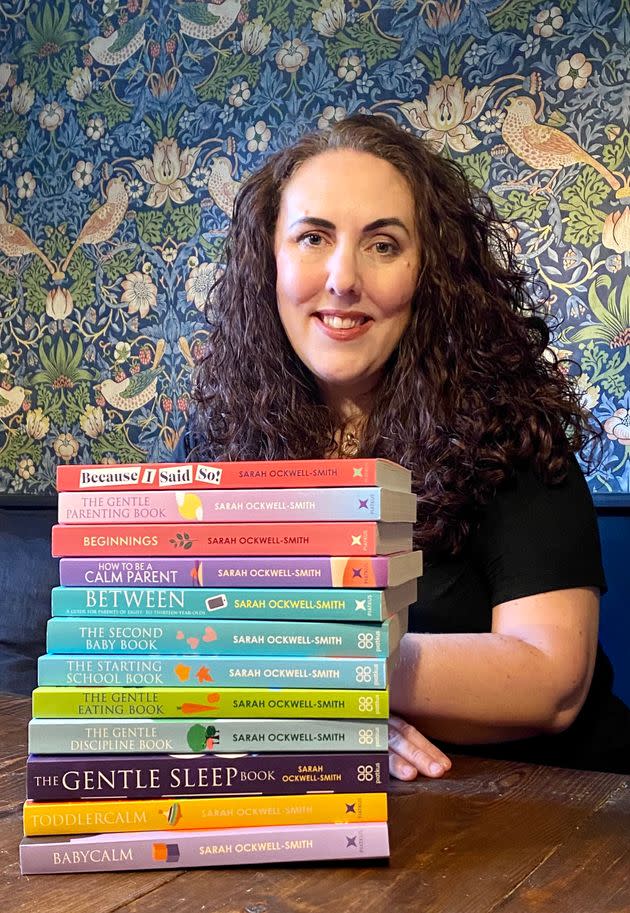I'm A Parenting Expert, This Is Why It's So Exhausting Raising Kids Right Now

A staggering 70% of parents believe it is harder to be a parent today than a generation ago, according to a recent poll by YouGov and Unicef UK.
As somebody who has four young-adult children and who has worked with thousands of parents over the last two decades professionally, I concur; raising children today is really, really tough.
Just over three-quarters (78%) of parents polled admitted they were struggling in the current cost of living crisis.
Rising fuel bills, escalating food prices, soaring interest rates, and rent and mortgage rises mean that families are struggling to provide the simple basics, let alone luxuries.
I volunteer for Citizens Advice, and each week I speak with parents just like you and me, who have unexpectedly fallen on hard times and are unable to buy groceries to feed their children.
They tell me they haven’t eaten properly for days, so their children can. The Trussel Trust foodbank charity says that demand for their services is rising substantially year-on-year.
When parents and children live in poverty, it places added strain on relationships, with research showing that parents in poverty are more likely to resort to harsh discipline methods. The children are the biggest losers.
It’s not just the cost of living crisis, this generation is facing a climate crisis and parents are worried about the future of the world they have brought their children into.
They’ve parented through a global pandemic, missing all-important antenatal classes and baby groups that help them to form a tribe of new parent friends to replace the metaphorical village that we so desperately need, but which is rapidly disappearing as we parent in isolation, away from our families.
Those with slightly older children during Covid had to emergency home-school, with no resources, no experience and little support.
Children missed important peer interactions and socialising and increasing numbers struggled with speech and language difficulties as a result, with a 110% rise in cases diagnosed post-pandemic.
In recent years, mental health problems in children and teenagers have been escalating – one in six children now have a probable mental health disorder, however NHS waiting lists for therapy are spiralling, with some parents telling me they can only access child and adolescent mental health services if their child is an active suicide risk.
If they’re not, then they face waits of a year or more to even access an initial appointment. Parents are faced with the impossible decision to either pay for private therapy for their children or pay the electric bill.

The author pictured with a vast range of her parenting books.
Our schools are over-full and crumbling, literally and figuratively. There is a massive teacher recruitment and retention crisis. Staff are despondent, underpaid and overworked in a broken education system.
Children are struggling, with school attendance levels lower than before the start of the pandemic. Children with special educational needs are increasingly unsupported and are significantly more likely to be permanently excluded from school.
Parents of children who struggle at school, due to systemic rather than parenting issues, are often blamed when what they – and their children – really need is more support.
We have been mis-sold a dream of ‘having it all’ – being mothers and balancing careers, but something has to give. Women have gained financial freedom back at work, yet they still carry the bulk of the mental load of parenting alone. They are expected to work like they don’t have children and parent like they don’t have a job.
They are so desperately tired trying to meet everybody’s needs that they rarely have time to meet their own. What happens when they are stretched so thin? They inevitably snap at their children, then instantly feel guilty for not living up to the myth of parenting perfection that is portrayed constantly in glossy Instagram mumfluencer accounts.
The internet is a double-edged sword, on the one hand providing much-needed support and instant advice and knowledge, but this information often proves overwhelming, confusing and guilt-inducing.
We’re also the first generation to be raising children online, bringing many questions about how to tackle screen time so it provides a balance between learning and living in the real world, full of tech, and not ruining them.
We may not be raising our children during a world war, or an era without life-saving medicine, but today’s world presents parents with many issues that have never been faced before.
We are balancing so much and we’re exhausted. Ultimately, the real victims of our over-stressed and over-stretched world are children, and knowing this sad fact only adds to the guilt already felt by parents.
Something needs to change for parents and, importantly, for children.
Because I Said So: Why society is childist and how breaking the cycle of discrimination towards children can change the world by Sarah Ockwell-Smith is available in trade paperback, £16.99.
Related...
Girls' Happiness Levels At 'Devastating' All-Time Low. But Why?
Parents Of Teens Warned Over 'Life-Threatening' Social Media Trends
Too Many Parents Have Felt Judged For How They Feed Their Babies
My Adult Children Are Moving Out. Here’s What No One Told Me I’d Feel
I'm A Dad Who Developed Paternal Postpartum Depression — And, Yes, It's A Real Thing

